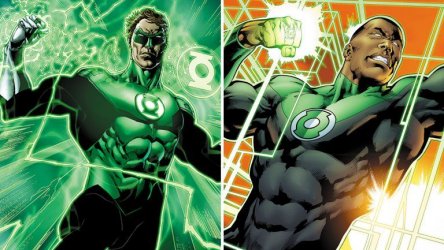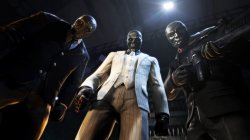- Sep 22, 2013
- 4,956
- 250
- 85
Comic book media have become very popular since the 1960s, and ethnic-minority comic book characters, or 'superheroes,' such as Storm (Marvel Comics), Black Panther (Marvel Comics), and John Stewart (DC Comics) represent America's interest in pluralism-themed storytelling and of course democracy.
I'm Asian-Indian and a U.S. citizen and Christian. I attended the prestigious Ivy League school Dartmouth College where I studied Cognitive Science. I learned a lot about the 'sociology of race' and the 'politics of democracy' as an undergraduate. I'm also a big fan of comic books and find ethnic-minority comic book characters such as Kato (DC Comics) and ethnic-minority comic book stylized video-game characters such as Raiden (Mortal Kombat) and Chun-Li (Street Fighter) very interesting. Such characters do reflect a modern civilization interest in 'pluralism perspectives' on customs, etiquette, and even folklore.
When an ethnic-minority living in America decides he/she wants to be a police officer or lawyer, we might imagine that they are patriotic and hence 'optimistic' about the potential for racial-equality in democratic USA, which is why they want to serve/work as civil servants of the state.
Since comic books often present stories about justice and civil stability daydreams (e.g., vigilantism, psychic intuition about violence-control, etc.), we might consider why a black (African-American) comic book superhero such as John Stewart (DC Comics), aka 'Green Lantern,' might inspire us to talk more 'liberally' about the 'quality' of prestige in civilization which must be geared towards social organization and labor-respect.
How should we then 'conceive' of new age folk-tales/fables (e.g., comic book stories) about ethnic-minority experiences that can be construed as 'extraordinary' (e.g., White Man's Burden, Black Panther)?
Should we evaluate such stories/movies in terms of dominant/standard or mainstream belief-systems and the politically-oriented groups that demand representation of fears of change (e.g., Christian Coalition)?
Should we use such stories/movies to talk more seriously about censorship in modern-day America?
====
"After Hal Larson explained to John Stewart that he was retiring from crime-fighting, Hal gave John his magic-ring which afforded him the superhuman power of becoming the hero we knew as the 'Green Lantern.' John felt humbled and honored but wondered if the Caucasian-mantle of the Green Lantern adopted by Hal should now be transferred/shifted to an ethnic-minority/African-American. However, Hal insisted that Americans demanded a continuation of the democratic-idealism espoused by the 'aura' (or spirit!) of the Green Lantern by embracing an ethnic-minority who donned the mantle of the superhero/crime-fighter in modern-day America. John accepted the title from Hal, and Hal was no longer Green Lantern."

"Green Lantern John Stewart went on a new crime-crusade dealing with an Aryan crime-syndicate operating in Los Angeles (California, USA) and targeting ethnic-minorities as victims. The syndicate was called 'Black Mask' (since all members wore a black-colored skull-mask), and it targeted ethnic-minority laborers, civil servants, celebrities, politicians, and even religious figures living in America. Black Mask wanted to use its narcotics-operation profits from Tijuana (Mexico) and Amsterdam (Netherlands) to fund a 'political podium' designed to 'cleanse' America of its 'pro-pluralism naivete'). Green Lantern John Stewart, the proud African-American title-holder of the Green Lantern (now that Hal Larson retired!) set out to destroy Black Mask and prove that America needed no 'race-based crusade'."

"After Green Lantern John Stewart methodically dismantled Black Mask (sometimes tackling the syndicate's ghouls/henchmen by tying them up with super-strong 'magic-green-ropes' emanating from his magical power-ring Hal Larson gave him), he was given a medal by the mayor of L.A. and invited to talk to school-children in Vatican City alongside the Pope. After his visit to the Vatican, Green Lantern John Stewart realized there was new controversy/intrigue in America regarding the Christian Coalition's insistence that the 'prominence' of an ethnic-minority/African-American 'superhero' (Green Lantern John Stewart) mandated a more serious evaluation of social values regarding the 'acceptability' of ethnic-minority crime-fighters who might be construed as 'not knowledgeable' in the affairs of Caucasian crime. Green Lantern John Stewart knew there was much 'discord' brewing, but he remained a patriot."
====

I'm Asian-Indian and a U.S. citizen and Christian. I attended the prestigious Ivy League school Dartmouth College where I studied Cognitive Science. I learned a lot about the 'sociology of race' and the 'politics of democracy' as an undergraduate. I'm also a big fan of comic books and find ethnic-minority comic book characters such as Kato (DC Comics) and ethnic-minority comic book stylized video-game characters such as Raiden (Mortal Kombat) and Chun-Li (Street Fighter) very interesting. Such characters do reflect a modern civilization interest in 'pluralism perspectives' on customs, etiquette, and even folklore.
When an ethnic-minority living in America decides he/she wants to be a police officer or lawyer, we might imagine that they are patriotic and hence 'optimistic' about the potential for racial-equality in democratic USA, which is why they want to serve/work as civil servants of the state.
Since comic books often present stories about justice and civil stability daydreams (e.g., vigilantism, psychic intuition about violence-control, etc.), we might consider why a black (African-American) comic book superhero such as John Stewart (DC Comics), aka 'Green Lantern,' might inspire us to talk more 'liberally' about the 'quality' of prestige in civilization which must be geared towards social organization and labor-respect.
How should we then 'conceive' of new age folk-tales/fables (e.g., comic book stories) about ethnic-minority experiences that can be construed as 'extraordinary' (e.g., White Man's Burden, Black Panther)?
Should we evaluate such stories/movies in terms of dominant/standard or mainstream belief-systems and the politically-oriented groups that demand representation of fears of change (e.g., Christian Coalition)?
Should we use such stories/movies to talk more seriously about censorship in modern-day America?
====
"After Hal Larson explained to John Stewart that he was retiring from crime-fighting, Hal gave John his magic-ring which afforded him the superhuman power of becoming the hero we knew as the 'Green Lantern.' John felt humbled and honored but wondered if the Caucasian-mantle of the Green Lantern adopted by Hal should now be transferred/shifted to an ethnic-minority/African-American. However, Hal insisted that Americans demanded a continuation of the democratic-idealism espoused by the 'aura' (or spirit!) of the Green Lantern by embracing an ethnic-minority who donned the mantle of the superhero/crime-fighter in modern-day America. John accepted the title from Hal, and Hal was no longer Green Lantern."

"Green Lantern John Stewart went on a new crime-crusade dealing with an Aryan crime-syndicate operating in Los Angeles (California, USA) and targeting ethnic-minorities as victims. The syndicate was called 'Black Mask' (since all members wore a black-colored skull-mask), and it targeted ethnic-minority laborers, civil servants, celebrities, politicians, and even religious figures living in America. Black Mask wanted to use its narcotics-operation profits from Tijuana (Mexico) and Amsterdam (Netherlands) to fund a 'political podium' designed to 'cleanse' America of its 'pro-pluralism naivete'). Green Lantern John Stewart, the proud African-American title-holder of the Green Lantern (now that Hal Larson retired!) set out to destroy Black Mask and prove that America needed no 'race-based crusade'."

"After Green Lantern John Stewart methodically dismantled Black Mask (sometimes tackling the syndicate's ghouls/henchmen by tying them up with super-strong 'magic-green-ropes' emanating from his magical power-ring Hal Larson gave him), he was given a medal by the mayor of L.A. and invited to talk to school-children in Vatican City alongside the Pope. After his visit to the Vatican, Green Lantern John Stewart realized there was new controversy/intrigue in America regarding the Christian Coalition's insistence that the 'prominence' of an ethnic-minority/African-American 'superhero' (Green Lantern John Stewart) mandated a more serious evaluation of social values regarding the 'acceptability' of ethnic-minority crime-fighters who might be construed as 'not knowledgeable' in the affairs of Caucasian crime. Green Lantern John Stewart knew there was much 'discord' brewing, but he remained a patriot."
====

